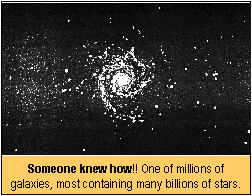Summary
What are the chances of a universe like ours with planets like ours creating itself by itself? The answer comes out so inconceivably low that it is virtually no different from no chance at all.
********
Is designing a universe easy or hard? It transpires that to put together a universe like ours, there are about twenty parameters (numbers) that are critical for specifying the kind of universe we cook up. The value we choose for the effect of gravity is one parameter. If we make it too strong, our stars will collapse to become black holes. If we make it too weak, they won't condense but will remain as a cloud of gas and dust. Another parameter is concerned with electric charge, how strong should we make the force of attraction between protons and electrons in atoms. Yet another determines how strong we make the force that holds the atomic nucleus together, and still another, how strong the cosmological constant should be, etc., etc. Designing an inhabitable universe introduces many more difficulties, so let's simply try for a universe having stars like ours.
Let's imagine God is seated before a bank of celestial computers having the twenty dials that tune the parameters for providing the required outcome. He starts with the most important--tuning the force of gravity. The control dial is set in terms of proton masses and must be tuned so that stars are formed of the right size and lifetime to eventually provide a stable universe. If the stars are too small, they will not ignite to burn their hydrogen fuel to helium, if they are too big they won't last long enough to be useful. Or they might collapse to a black hole.
After some tinkering, the computers throw up the number, 1x10-38 proton masses. That means one divided by 10 followed by 38 zeros. Now that's tiny. God punches a few keys and gets some answers--the expected life of an average star comes out as ten billion years, which is about what is needed. Dropping a zero reduces lifetime by 1000-fold, drop another zero and the star lasts only 10,000 years. God accepts the computer value.
The next important job is selecting a cosmological constant that will fix the mass-energy density of space. The computers say it must be set to no more than 10-40 proton masses. More tinkering and it is found that for any bigger value, the universe won't last long enough to produce stars. God again accepts the computer value.
God still has 18 parameters (values) to assign. While he does the work, let's find out what the chances are of getting our kind of stars in our kind of universe if we just spin those twenty tuning dials at random.
That's not a major problem for the celestial computers, and the answer comes in a fraction of a second as just one chance in 10229. That means one chance in 10 followed by 229 zeros!!! One chance in 10229 is so incredibly slight as to be beyond our wildest imagining--for all intents and purposes, impossible.
But a starry universe is only a beginning. For life to exist, the stars need to have planets and, among other things, inhabitable planets need to have an orbit giving a temperature range that permits permanent surface water to exist. Then an atmosphere, the right balance of chemicals, and thousands of other critical little things are essentials. Like the crucial need for an ultra-violet light filter at the top of the atmosphere. Or the right amount of oxygen in the atmosphere. A few percent increase and our forests and grasslands go up in an unstoppable blaze. Or too much carbon dioxide, temperatures soar, and the ice cap melts.
And so, from what commenced as just a modest design project, we have begun to realize the enormous complexity of our self-appointed task--to the point of appreciating that even the most highly skilled team of scientists ever assembled could not design our universe, let alone create it. In fact, starting from nothing, our team could not even serve up its own breakfast. Which leads us to a question: if an all-knowing, all-powerful God did not create our universe, then who or what did???
P.S. Did you know?? If a soup composed of the nucleotide ingredients (building blocks) for DNA is made to polymerize at random, the chances of forming a single functional gene averages about 1 in 10150. That number is far, far higher than the total number of stars in the whole of the visible universe. And all higher animals require thousands of functional genes!!! Boggles the mind does it not? I wonder what mind really is?



